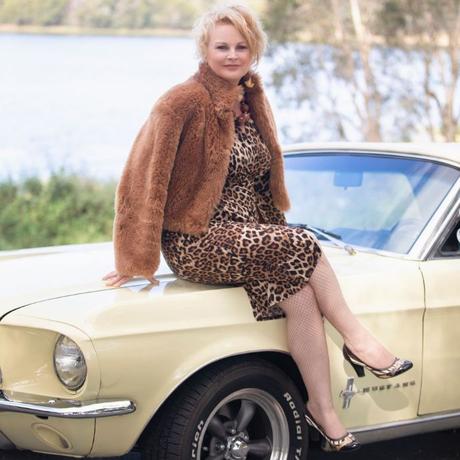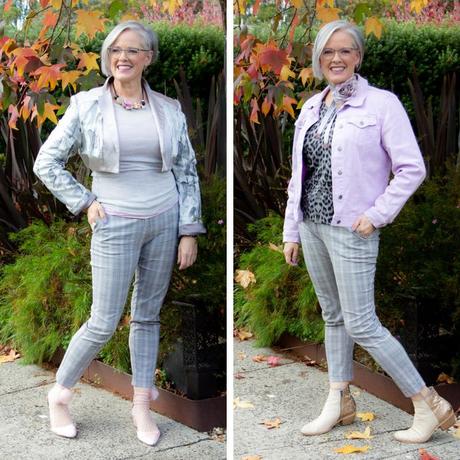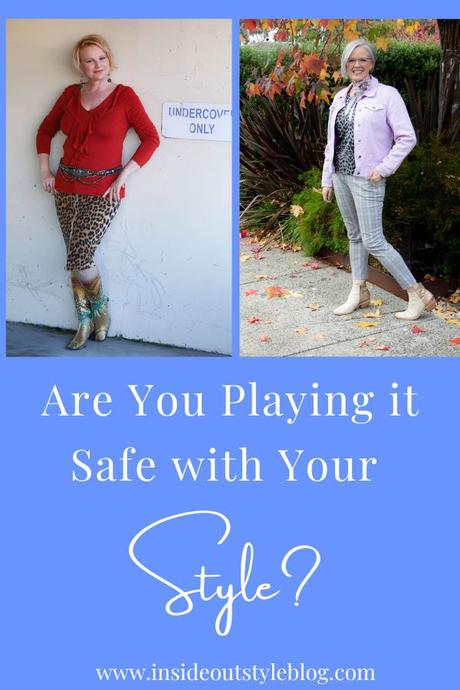What does playing it safe with your style mean to you?
Jill Chivers of 16 Style Types and I discuss this in the video below and link it to personality type.
Do you want to stand out or blend in?
Do you naturally want to play it safe? It feels comfortable? or Do you feel that playing it safe is too boring and almost like a straight jacket for you?
If you are someone who likes to have a more safe style, when you copy someone else's more flamboyant style (thinking that that's how to be stylish) it can make you feel ungrounded and inauthentic.
Then there are others who have gone to extremes such as quitting jobs because of the dress code being too strict for them, making them feel boxed in, stifled, and unable to express themselves and bring their best self to work (and I know that I'm more this way than the other, as I remember a time in one of my early jobs where management talked about bringing in a uniform and I remember thinking to myself "I'll be quitting then" as even the thought of wearing a uniform makes me break out into hives).
Do You want a Strict Set of Rules or a Very Loose Set of Guidelines for Your Style?
I've noticed that some of my clients want a set of style rules they can follow, that they don't want to vary from. This makes them feel safe.
Other clients, will want more of a self-imposed set of loose guidelines (please don't talk 'rules' to them) that they will use as a handrail (rules feel like handcuffs to them).
Are you Playing it Safe and What Does that Mean to You?
When I'm playing it safe, I'm usually in an overly analytical space where I'm thinking too much about what my outfit is communicating, whether it's giving me the credibility I crave, making me look like the expert I am and that I'm living up to my "image consultant" brand. This relates to my psychological type (INTJ) as getting out of my head and an outfit into the world can sometimes be a sticking point for me.
For Jill, who has a very different psychological type to me (ESFJ), for her, playing it safe means that she's being lazy, not pushing herself to put on a stylish outfit, just getting dressed without really thinking. When she's feeling down she doesn't pay attention to the details in the way she would when she's feeling more buoyant.
For Jill, her Sensing function ( introverted Sensing to be precise) gives her stability to have continuity in her style, which almost has a uniform aspect (though it won't look like a traditional uniform). Relying on tried, trusted combinations give them a feeling of stability that motivates her style upward. Jill says that her ability to use the detailed information from her past dressing experiences helps her create new stylish combinations that have a theme (leopard print, being one of them for Jill as it's her Signature pattern) that is easily observed by others.
Jill loves to find herself a formula and repeat it in different ways, such as changing up colours, in which garment the leopard print appears and of course different accessories.

For other types (such as mine as an INTJ or some of us with a preference for Intuition), too much of the same formulas or combinations feel boring. Instead, I try and create new outfits from my existing clothes every day, something a little different, as it feels more exciting to me (and even a bit risky at times). I'm also not great at remembering exact combinations I've done before as I'm a big picture thinker, rather than being a details person as Jill is.

As an example, here are the same check pants worn two ways (and I have many more outfits with these pants that I've shared here over the last few years that I've owned them).
Even a Self-Imposed Uniform Can Be an Expression of Your Personality
Those classic "uniform" dressers, Anna Wintour, Steve Jobs, Mark Zuckerberg, as examples, all have thought about their style, and made a conscious decision about what it is that they are wearing (interestingly all are considered to be NT - Intuitive and Thinking - types in the Myers Briggs system). They have created a system or process for getting dressed quickly and easily that works for them and they feel carries them forward to do the things they want to do in life. This is one of the reasons we call the NT Super Style - the Style Strategist - there is always a conscious strategy behind their style - even if it's not overtly obvious.
Style from the Inside Out
It's so easy to waste money on the wrong clothing as we go outside of who we are at our core, as we don't really know who we are and how we should be expressing ourselves through our clothing, instead of going inside, we listen to external advice from fashion magazines, fashion influences, our friends and family, rather than figuring out who we are and how we want to express that amazing woman.
What is safe for you may not be safe for someone else. This is where it's all so personal. This is why research shows the "average woman" doesn't wear around 1/3 to 1/2 of what she buys each year. It can be because we've played it too safe and bored ourselves silly, or not safe enough, gone outside of our comfort zone and personality too far. Understanding your personality and its impact on your style helps you make the very best style decisions.
Here are some questions for you to ponder
- What does it mean to play it safe with your style?
- What may motivate you to play safe with your style?
- What's the impact of playing it safe with your style?
- Playing it safe may not make you feel good, and it may not be helping you in your broader life if you're really playing it safe?
Want to Know How Your Personality Influences Your Approach to Style?
Do you want to discover your Style Type? To really explore your attitude to style, how you put outfits together, and what works for you in a psychological sense so that it feels completely true and authentic to you? If so, then check out our Your Type of Style program which only opens once a year. You don't need to know your type as it's something you can discover in the program. It offers a completely different opportunity to look at your style in a new way. Your Type of Style is an invitation to discover yourself and how you want to express that through your style.


